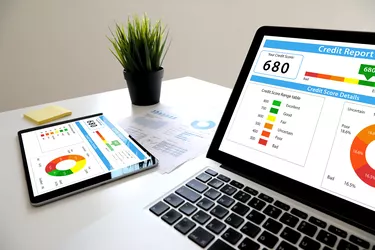
If you'd like to live a stress-free life that comes with being financially secure, you'll need a plan to get there.
What does being financially secure mean? It means being able to pay all your bills on time and still have money left over, having money set aside in an emergency fund and saving and investing a portion of your income for special events and retirement.
Video of the Day
Video of the Day
Here's how you can use the information in your credit report to help you reach those goals.
What’s In a Credit Report?
These are the factors in a credit report and the percentage that each impacts your credit score.
Payment history (35 percent): Are you paying your bills on time, or do you have too many bills and you're struggling to keep up? Your credit history has the largest influence on your credit score.
Credit card utilization (30 percent): Credit card utilization is the percentage of debt outstanding compared to the maximum credit limits. For example, if you have an outstanding balance of $3,000 against a $5,000 line of credit, your credit utilization would be 60 percent. Below 30 percent is good, but less than 10 percent is best.
Length of credit lines (15 percent): The longer you've had your accounts, the better for your credit score.
If your credit report shows that your credit utilization rate is high, like 60 percent, you can create a plan to steadily reduce your credit card debt by making more than the minimum payments each month and not adding any charges.
New accounts (10 percent): Applying for new credit card accounts will create hard inquiries, which can temporarily have a negative impact on your credit score.
Credit mix (10 percent): Having a mix of different types of credit, such as credit cards, auto loans, student loans and mortgages, can add a few points to your credit score by showing that you can handle all types of debt responsibly.
A credit score is a measure of your personal finance health. A low score means you may have late payments and you're probably borrowing too much money. A good credit score means that you're handling all of your finances responsibly, paying your bills on time and you probably have a low amount of debt.
You can get a free credit report once a year at annualcreditreport.com.
Consider also: What Does Delinquency on a Credit Report Mean?
How to Use Your Credit Report to Improve Financial Health
You can use the factors that make up a credit score as guidelines on ways to improve your financial health. You can evaluate your finances the same way that lenders do.
For instance, make sure you make all your bill payments on time and don't have any 30 or 60 days past due payments. This means you keep enough cash in the bank account to pay your bills as they come due and avoid any delinquencies.
If your credit report shows that your credit utilization rate is high, like 60 percent, you can create a plan to steadily reduce your credit card debt by making more than the minimum payments each month and not adding any charges. One additional benefit of lowering your utilization ratio is that you will begin to get offers for lower interest rates. This means you can allocate more of your funds to paying down your debt than simply paying high interest fees.
If the length of time you've had your accounts is short, you might be able to have someone who has older, well-managed accounts add you as an authorized user.
Create a Budget
After you look at your credit report and identify the areas that need improvement, you can start to develop a plan that will lead to improvement in your financial well-being.
Learn where your money is coming from and where it's going by creating a budget. Look at your bank statements and your credit cards to see where you're spending your money.
With this information, make a list of all your bills and expenses to see which are absolutely necessary and highlight those that can be reduced or eliminated.
Set goals. Include contributions in your budget to building up an emergency fund and putting money into savings.
Consider also: 3 Ways to Improve Your Credit Score
Review Your Credit Reports Often
Check your progress regularly with the three major credit bureaus – Experian, Equifax and TransUnion – and your FICO score. Pay particular attention to your payment history, any high credit card balances that increase your credit utilization ratio and any negative information that should be corrected.
It'll take time to build up your financial health, but by focusing on improving those factors that make up a credit report, you'll be on your way to achieving an excellent credit score.